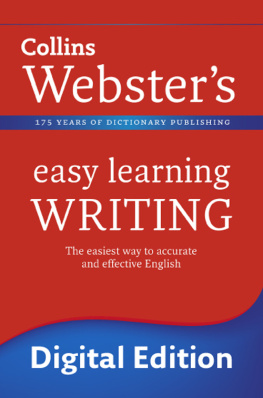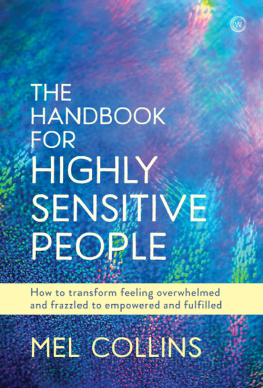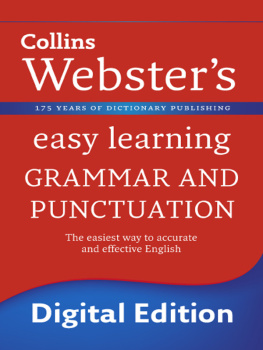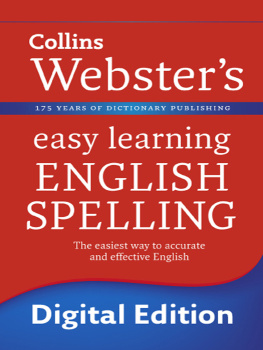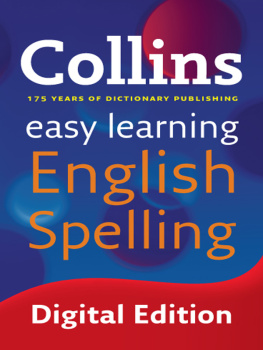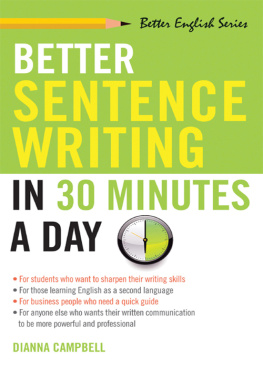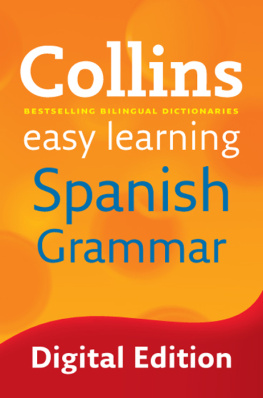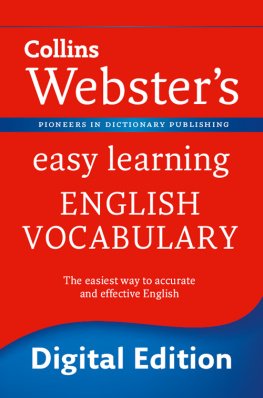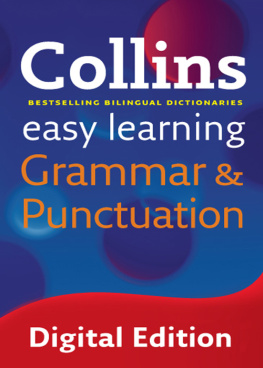HarperCollins Publishers
Westerhill Road
Bishopbriggs
Glasgow
G64 2QT
First edition 2010
Reprint 10 9 8 7 6 5 4 3 2 1 0
HarperCollins Publishers 2010
ISBN 978-0-00-744465-6
Collins is a registered trademark of HarperCollins Publishers Limited
www.collinslanguage.com
A catalogue record for this book is available from the British Library
Typeset by Davidson Publishing Solutions, Glasgow
Printed in Great Britain by Clays Ltd, St Ives plc
All rights reserved under International and Pan-American Copyright Conventions. By payment of the required fees, you have been granted the non-exclusive, non-transferable right to access and read the text of this e-book on screen. No part of this text may be reproduced, transmitted, downloaded, decompiled, reverse engineered, or stored in or introduced into any information storage and retrieval system, in any form or by any means, whether electronic or mechanical, now known or hereinafter invented, without the express written permission of HarperCollins.
EPUB Edition June 2011 ISBN 978-0-00-744465-6
Entered words that we have reason to believe constitute trademarks have been designated as such. However, neither the presence nor absence of such designation should be regarded as affecting the legal status of any trademark.
Editorial staff
Written by:
Elizabeth Walter and Kate Woodford
Editor: Lisa Sutherland
For the publisher:
Lucy Cooper
Kerry Ferguson
Elaine Higgleton
introduction

Collins Easy Learning Writing is suitable for anyone who wants to write clear, elegant English, whether at school, at home or at work.
It is written in a simple, clear way, with lots of examples showing how the guidance given can be put into practice.
The book has three main parts:
The first part deals with the things you need to know before you can write effectively. The topics covered here apply to all types of writing, and range from planning your writing to checking it at the end. There are sections on the best way to present your writing on the page, on how to structure longer documents, and on many tricky issues such as how to write speech, abbreviations, numbers and more. In addition, there is a comprehensive section on style, covering areas such as writing plain English, avoiding ambiguity and writing with the appropriate level of formality.
The second part takes a detailed look at different types of writing, from informal emails and letters to formal essays, reports and presentations. It gives advice on structure, tone and style, and examples of good practice, as well as providing suggestions for useful words and phrases to use in your own work.
The third part covers grammar, punctuation and spelling. It gives the basic rules you need to know and draws attention to common mistakes and shows you how to avoid them.
We hope Collins Easy Learning Writing will help you to write with confidence and success.
Elizabeth Walter & Kate Woodford, 2010
Preparing to write
PART ONE
Preparing to write
Thinking about your writing
Whatever you are writing, it is important to think about it first.
If you plan your writing well, it will be clear, logical and effective.
You may think that planning your writing is just one extra job, and a waste of time, but in fact good planning will probably save you time as well as making your writing better.
Planning does not necessarily take a lot of time, and you do not always need to make a written plan. For instance, it would be silly to make a written plan for a text message the whole point is that texting is a quick way of communicating. However, even with a text message, you should plan in your mind, so that you know what you want to say.
For longer pieces of writing, such as essays, reports, and often even letters, it is very useful to make a written plan. A plan will help you:
organize your thoughts
make sure you are clear about what you want to write
make sure you have all the information you need
make sure you dont leave anything out
Key point to remember
Planning will save you time and make your writing more effective.
Before you start to write, the most important question to ask yourself is: What am I trying to achieve?
The best way to be clear about this is to ask three questions:
1. Who is this writing for?
2. What do I want to say?
3. Why do I want to say it?
Imagine, for example, that you really like animals, and you need a holiday job, so you decide to write to the local zoo. In this case, the answers to the questions above could be:
1. The manager or personnel officer of the zoo.
2. That you want a summer holiday job. That you love animals and worked on a farm last year.
3. Because you want to get a holiday job in a zoo.
There are important points to remember about each of these questions:
Who? Make sure that you use a suitable style and tone for your audience. Informal language and jokes are fine for your friends, but a job application needs to be more formal.
What? Make sure that what you say is absolutely clear, and that you have included everything you wanted to include.
Why? Make sure the letter achieves what you want it to achieve. For instance, if you write a letter of complaint, be clear about what you want to happen: are you writing it because you want an apology, or do you want your money back?
Before starting to write, it can sometimes be helpful to make a brief summary of what you are trying to achieve. This can help you to concentrate on the most important points of your writing.
When you have finished your writing, you can go back to your summary and check that what you have written achieves what you wanted it to. A good summary will always answer the questions, who?, what? and why?
Here are two examples of this kind of summary:
A survey of students opinions of the food in our school canteen, to be used as the basis of a campaign for better school meals.
A letter of complaint to the manager of the local theatre to say that our recent visit was spoiled by the noise of building work going on in the bar area, and to ask for our money back.
Your summary can also help you resist the temptation to add too many details or extra points. Remember that many people are busy if they do not understand your main points quickly, you may not achieve what you hope to achieve.
Key point to remember
Always be clear about the purpose of your writing.
Organizing your ideas
Whatever you are planning to write, you need to organize your ideas, either on paper, on your computer, or in your head.
There are several good things about this stage of writing:
You do not need to worry about grammar and spelling
You do not need to write whole sentences: single words, phrases, or even pictures are fine
You do not need to put your ideas into any kind of order to begin with that can come later
The act of writing things down can give you new ideas
It is also fine to write down things that you dont know!
Next page
